March Brown dry fly patterns have stood the test of time, some dating back to the 19th century. Originally tied to imitate the Rhithrogena Germanica mayfly, a staple hatch in European and North American waters, this fly has long been a favourite among anglers pursuing trout in springtime rivers. Its natural, earthy tones and realistic silhouette make it a deadly choice during early-season hatches when fish are keyed in on emerging mayflies.
Over the years, I’ve tied and fished many March Brown dry fly patterns, but this Upright version is my current favourite because durable, relatively easy to tie, it sits in the surface film, and is eagerly taken by trout when March Brown duns and/or Large Brook Dun (Ecdyonurus Torrentis) are hatching in spring,
How to tie the Upright March Brown dry fly
Fly tying material list:
- Hook: #14 & 12 Kamasan 402
- Thread: Rusty brown 8/0 Uni-thread
- Tail: Grey partridge neck
- Body: WAPSI Fox squirrel dubbing
- Rib: Yellow silk floss
- Wing: Elk deer hair
Step-by-step fly tying instructions:
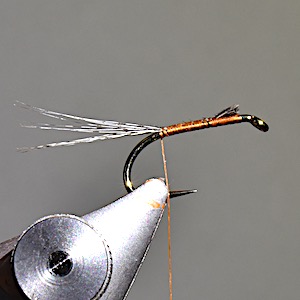
Step 1. With the hook locked in the vice, start the rusty brown 8/0 thread at the head and take in touching turns to the bend. Opposite the barb, tie in the partridge tail.
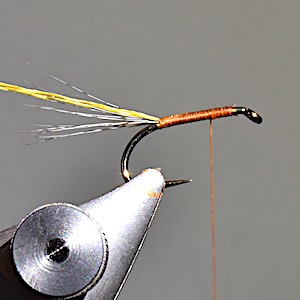
Step 2. Take 3 inches of yellow silk floss and split off 2 strands. Then tie 2 of the strands at the bend, which will be used later for the rib of the fly.
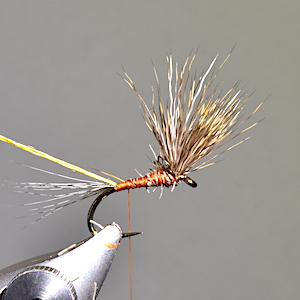
Step 3. Take a small bunch of deer hair, remove the guard hairs, and stack. Position the tips of the hair to protrude over the eye by about a hook length. Secure the deer hair on top of the hook such that it forms an upward fam.
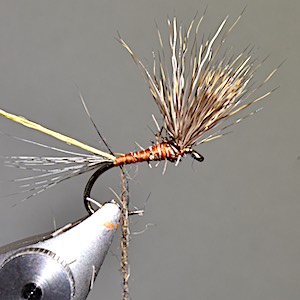
Step 4. Wax the rusty brown thread. Then, take a small pinch of the fox squirrel dubbing and lightly dub the thread.
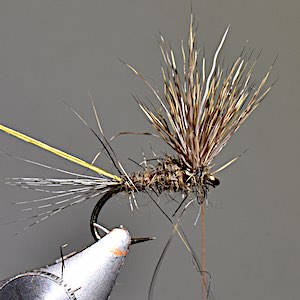
Step 5. Form the body of the fly with the dubbed thread. Make 1 turn of dubbed thread in front of the deer hair wing so that is fans upright.
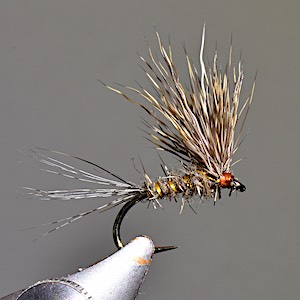
Step 6. Wind the yellow silk floss forward to form the ribs and tie it off by the eye. Finally, build a small head with the thread, whip finish, and apply varnish.
Fly fishing tips March Brown dry fly
On wild rain-fed rivers and streams, dry fly fishing is often the best approach for trout feeding on the duns as they emerge.
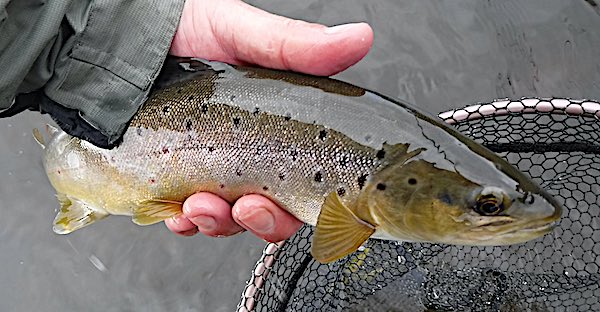
Usually, MB flies hatch at the heads of pools fed by oxygenated water and in the riffle sections of rocky rivers. On the Welsh Dee, where I predominately fish, good examples of pools include:
Studying the aforementioned pools will provide a clear understanding of what pools to for on other rivers.
Equipment-wise, I use a 9ft 5# rod for dry fly fishing. Attached to the floating line is a 9ft 5X copolymer leader tipped with a 3 to 4 ft length of 3lb fluorocarbon.
It is important to apply Fullers Mud to the fluorocarbon tippet to remove its shine and make it sink. Whereas, Mucilin grease is applied to the remainder of the leader.
Acknowledgements:
Lewis Newton for the image of the natural MB dun.
Finally, I hope this article stimulates you to tie this Upright March Brown dry fly and test it on your local river or take a trip to fish the Welsh Dee at Llangollen, where it catches plenty of spring brown trout.
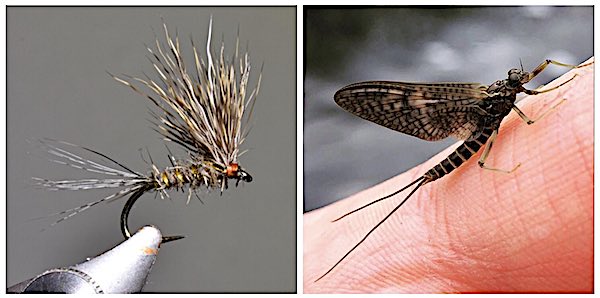
Looks a very nice fly,I like the thought that it sits nicely, a bit lower than a traditional dry fly, I cannot see anything refusing this offerering!Thanks
Hi Robert,
It’s a good pattern because it will also take trout and grayling feeding on LDO and large brook duns. A good searching pattern.
Cheers, Andrew
Lovely fly Andrew I expect your fly boxes are reaching saturation point , plenty of tying time zero fishing time . Be nice if the lockdown is lifted as the first March brown appears wouldn’t it ?
Hi James,
You’re spot on there. I’m currently filling up a reserve fly box, so will be fully stocked for the remainder of the year by the time lockdown eases. However, my son and fishing mates usually relieve me of quite a few flies.
At the moment it looks like we might miss the best of MB hatch on the Welsh Dee unless it comes late this year.
Cheers, Andrew
Would this dry version support an MB emerger or nymph pattern on a dry fly and dropper system? What alternative set up could be tried?
thanks for the continuing interesting articles!
It should do.